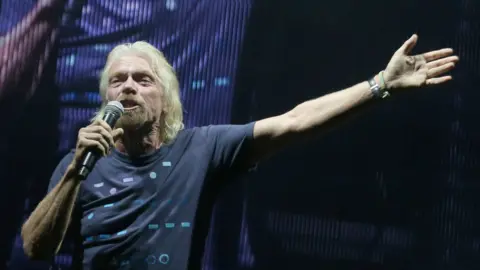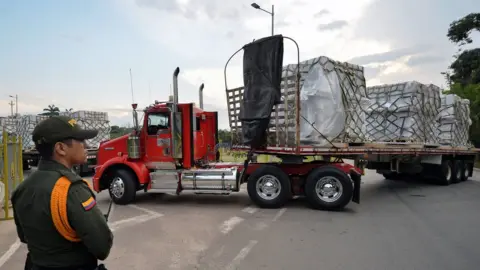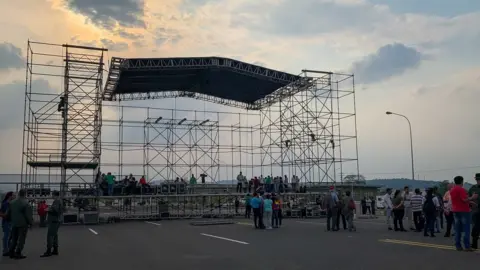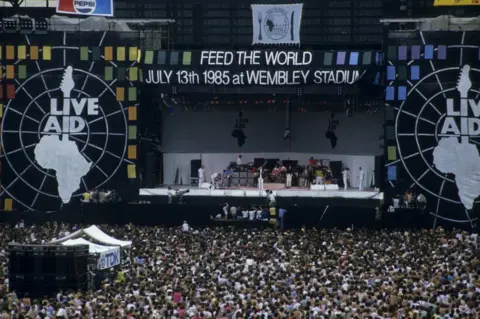Venezuela Aid Live: Why is Branson being told to 'back off'?
 Getty Images
Getty ImagesTo say Venezuela is in the middle of a political crisis would be an understatement. President Nicolás Maduro is locked in a power struggle with Juan Guaidó, an opposition politician and the self-declared interim leader of the country.
So what better way to make the situation less complicated than to add a spat between one of the world's richest people and the bass player from Pink Floyd?
Yes... it's a pretty weird situation.
Richard Branson, the British billionaire behind the Virgin group of companies, announced last week that he wanted to hold a concert to raise money for aid for Venezuela - inspired by similar benefits like Live Aid.
The concert, Venezuela Aid Live, is happening on Friday in the Colombian border town of Cúcuta, near a bridge that connects it to Venezuela (a bridge, incidentally, that President Maduro has blocked off with shipping containers to prevent US aid getting in).
Mr Branson says the concert will be free for people who can go in person, and live-streamed internationally for those who can't.
The ultimate goal, Mr Branson says, is to raise tens of millions of dollars through donations, and to get aid through President Maduro's blockades - although how exactly he will do that remains unclear.
"Let the music inspire and mobilise you," he adds. "United through music, we can make a huge difference and help bring an end to the needless suffering of millions."
In response, Pink Floyd co-founder and bassist Roger Waters released a video telling Mr Branson to "back off".
What did Roger Waters say?
In a two-minute video posted on Twitter, the musician says Mr Branson's "Live-Aid-ish" concert has "nothing to do with humanitarian aid at all".
Allow X content?
"It has to do with Richard Branson, and I'm not surprised by this, having bought the US saying: 'We have decided to take over Venezuela, for whatever our reasons may be,'" Mr Waters says.
"But it has nothing to do with the needs of the Venezuelan people, it has nothing to do with democracy, it has nothing to do with freedom, and it has nothing to do with aid."
He adds that he has "friends that are in Caracas" who claim there is "no civil war, no mayhem, no murder, no apparent dictatorship, no suppression of the press".
So who asked Richard Branson to do this?
Mr Branson says it was a direct request from Mr Guaidó and opposition leader Leopoldo López.
Allow X content?
In a social media video posted last week, the billionaire says: "Juan Guaidó, who has been recognised as Venezuela's legitimate president by over 40 nations, and the EU, and Leopoldo López, an opposition leader currently under house arrest in Caracas, have asked us to help organise a beautiful concert, to help bring global attention to this unacceptable, and preventable, crisis."
Mr López has been under house arrest since 2014.
Who is going to perform?
The concert's organisers have released a list of 32 people they have invited to perform, which includes young Latin stars Rudy Mancuso, Juanes and Despacito singer Luis Fonsi, and Swedish DJ Alesso.
A few celebrities have also confirmed on social media that they're taking part.
Lele Pons, a Venezuelan-American singer and actress who was the most-looped individual on Vine before it shut down in 2016, and Venezuelan singer Danny Ocean have both released videos saying that they will perform.
Allow X content?
How much money do they want to raise?
According to Mr Branson, the goal is to raise $100m (£76.8m) in 60 days through donations on a website.
An added goal, organisers say, is to "reopen Venezuela's border so humanitarian aid can finally reach those who need it the most".
Which takes us neatly to our next point...
How are they going to get aid into the country?
This is a much trickier question - and the answer is: we don't know.
For context: there is a bridge between Cúcuta and Venezuela, with US military planes and lorries carrying tonnes of humanitarian aid parked on the Colombian side.
So, the aid is there. Mr Maduro, however, has blocked the Venezuelan side with shipping containers.
 AFP
AFPMr Maduro says the aid is part of a plot by the US to invade the country, while his Vice President, Delcy Rodriguez, claims the US aid is contaminated with carcinogens to "poison our populations".
The president has said that he's willing to take aid from his allies - Cuba and China, for example - but he has explicitly refused to accept anything from his opponents.
Mr Branson, who explicitly blames Mr Maduro for the crisis, would most likely fall under this category.
Mr Guaidó has said he plans to get aid into the country on 23 February, by urging Venezuelans to mobilise en masse and form "caravans" and a "humanitarian avalanche" at the borders. Even with this effort, it is uncertain whether or not aid will be allowed in.
A spokesman for Mr Branson told BBC News that he was working with the Colombian entrepreneur Bruno Ocampo to organise the concert and sort out the logistics - while Mr Ocampo said their methods for getting aid over the border "remain confidential, to prevent compromising our efforts".
He added: "Our plans are well orchestrated and we will soon share more details."
How has Maduro responded?
This is where it all gets even stranger.
As news of Mr Branson's concert came out, the embattled president responded by promising a concert of his own - dubbed "Hands Off Venezuela" - just 300 metres away, on the other side of Las Tienditas Bridge.
The government hasn't announced an official line-up, but unconfirmed reports are claiming that about 150 artists will be taking part.
 EPA
EPAShould aid be non-political?
This is the view of Mr Waters - and of humanitarian organisations like the United Nations and Red Cross.
For example, United Nations spokesman Stephane Dujarric told reporters earlier this month that "humanitarian action needs to be independent of political, military or other objectives".
He added: "What is important is that humanitarian aid be depoliticised and that the needs of the people should lead in terms of when and how humanitarian aid is used."
Mr Waters referenced this when he told Mr Branson: "Don't politicise aid. Leave the Venezuelan people alone to exercise their legal right to self-determination."
The bass player, however, waded into politically murky waters himself when he confidently proclaimed that there was "no apparent dictatorship" in Venezuela.
A spokesperson for Mr Branson told BBC News that the primary aim of the concert was to "raise awareness" and to "create a way for the global community to pledge their support".
They added: "While the political context of the crisis is complex, this is purely a humanitarian effort that cannot replace the need for political and diplomatic solutions."
Do people still want benefit concerts?
Live Aid was arguably the pinnacle of the benefit concert, eventually raising a reported $125m for victims of the famine in Ethiopia in 1985. In fact, it's so legendary that it was recreated in all its glory in the recent Freddie Mercury biopic Bohemian Rhapsody.
And announcing that he was hosting Venezuela Aid Live, Mr Branson specifically says he was inspired by the Concert for Bangladesh in 1971, and by Live Aid, and how they both "moved the world to action".
 Getty Images
Getty ImagesBut behind the glamour of these concerts were troubling reports that the money raised hadn't quite ended up where it was supposed to.
In the case of Concert for Bangladesh, the cash was tied up in a decade-long battle with tax officials in the US, while Live Aid was plagued by unconfirmed reports claiming the money it had raised was actually being used by Ethiopia's leader to amass weapons to crush opposition rebels.
There have been similar concerns about subsequent benefit concerts. Huge, high-production gigs have often been followed up with questions about how the money was organised and distributed to the people that needed it.
Benefits after the 2010 earthquake in Haiti, for example, are thought to have raised more than $9bn - but these fundraising efforts were later marred by allegations of financial impropriety by musician Wyclef Jean's charity Yele Haiti. Years after the disaster, people in Haiti said their communities were far from being rebuilt.
Venezuela Aid Live's organisers, however, tell BBC News that Live Aid and Concert for Bangladesh "helped raise global awareness" and "mobilised unprecedented public support".
"It is fair to say that in the decades since [these concerts], co-ordination in the humanitarian sector has improved enormously," they say, adding that the technology involved is better too.
"Based on the many lessons learned, the organising team is committed to an approach that is professional, unbureaucratic, efficient, transparent, and accountable."
All of the money raised will be transferred to the Colombian NGO Solidaridad Por Colombia, they add, which will hold it in a trust before working with aid experts to distribute it.
